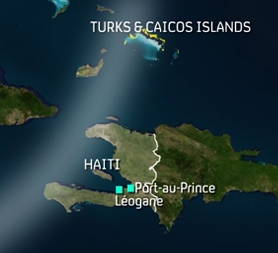Haiti spared worst of Hurricane Tomas
Fears that Hurricane Tomas would bring further devastation to Haiti have been eased, as refugee camps in the capital, Port-au-Prince, are spared the full force of the hurricane.

Seven people have been killed as a hurricane hit western Haiti, badly flooding areas that were left devastated by January’s earthquake.
Emergency workers have warned the heavy rain could cause mudslides and exacerbate the country’s cholera outbreak.
However, many refugee camps were spared the full force of Hurricane Tomas, which battered Haiti’s western coastline yesterday with winds of 85mph, badly flooding the seaside town of Leogane.
But the capital Port-au-Prince escaped the worst of the hurricane, which forecasters downgraded to a tropical storm as it passed the Turks & Caicos Islands heading into the Atlantic.
Thousands of homeless survivors of January’s earthquake, which killed a quarter of a million people. Huddled under rain-drenched tent and tarpaulin shelters in muddy encampments. Meanwhile, scattered flooding was reported in coastal towns.
Haitian authorities are still struggling with the devastation caused by January’s earthquake and a deadly cholera outbreak.
Kate Alberti, a cholera specialist working with Medecins Sans Frontieres, told Jon Snow that the cases of cholera in Haiti were spread quite widely over the country and not simply concentrated in the capital, Port-au-Prince.
She explained that the cases that had been discovered in Port-au-Prince related to people who had been to five other affected “departments” in the country and then come to visit the capital. Ms Alperti stressed that cholera was spreading in rural areas, moving from one village to another.
She said the cholera was being transported and absorbed through ingestion of infected water or food.
The first suspected cases that were seen by MSF teams were on 20 October of this year. Kate Alberti, Medecins Sans Frontieres
“Although the rivers are flooded, if people have access to clean drinking water and they can prepare food correctly (…) and wash their hands with clean water, soap, before eating, then in fact they can protect themselves, despite this flooding,” she said.
Ms Algerti said it was difficult to predict how the outbreak would progress, but she conceded that the flooding had not helped the situation.
Medecins Sans Frontieres had been in the country for more than 20 years, she said, and the first suspected cases of cholera were seen by MSF teams on 20 October of this year.